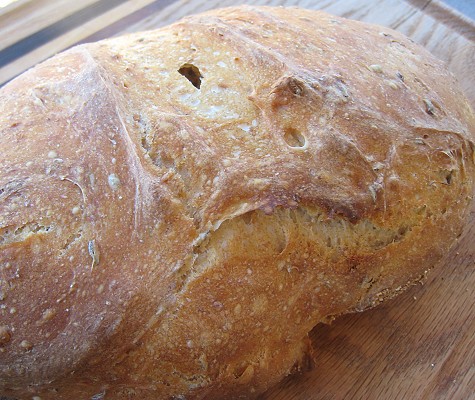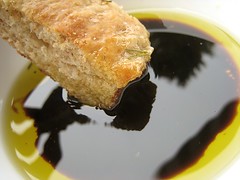
[js]
One of the things I've gotten into, or was just getting into, before our move was breadbaking.
I've tried doing foccacia breads, plain or with toppings, and I've been wanting to stretch my breadbaking muscles to make other breads.

left: plain foccacia; right: potato cornmeal foccacia
[js]
The problem -- or so I have analyzed it -- why I couldn't seem to do any other breads is the time and scheduling factor. Can't quite get the hang of it, the starting, the kneading, the rising, the waiting, the baking, the waiting, the more waiting, the cooling, the eating.
With foccacia, I know that I have to start it approximately 2 hours before I want to eat it. With the challah, that was a quick one-off, almost a throw-away bake, because I really did not expect to be eating it for breakfast, lunch, or dinner. In other words, there was no pressure. It was done one Sunday morning when I had some time to kill and it was more a trial than anything else. The eating was just a bonus.
I can't really keep baking breads that I don't expect to eat. Or expect anybody else to eat. It would be too wasteful for my frugal soul. With breads I want to eat and want to serve, time becomes a big issue. Breads would have to be available at a reasonable time, for meal appearances. Being in and out all day, every day, I don't really know how I can schedule my breadbaking.
I have been hearing about Artisan Bread in Five Minutes a Day. Five minutes a day, you say? Okay then, I figured I'd try that. I bought the book and started choosing breads I wanted to make.
I chose what the authors call their Deli-Style Rye. I don't think I've ever had bread with caraway seeds before, so I was excited to try this one. Plus, I keep thinking of the fantastic sandwiches I can make on this rye.
I think this first rye bread was a fluke. Here it is again in all its glory.
[js]
I didn't expect to like it as much as I do. In fact, I had it for lunch three consecutive days. Slightly toasted, with a dab of butter. The flavour was awesome, the caraway seeds adding a refreshing, almost minty taste and fragrance that plays so well with the butter.
After this first successful rye loaf, I've had problems. There's a whole slew of problems that I haven't yet found the cause for nor the solution to -- and I've been reading up on breadbaking, trying to figure things out, to no avail.
(1) Overly crusty: there are breads that seem to be all crust. Why?
(2) Refrigerated dough: sometimes there is a strong smell of alcohol. I had to throw out a brioche dough because it was too overly alcohol-y.
(3) Finished product does not seem to be bigger than the dough I started with. It stays almost the same size, just becoming 20% to 30% bigger.
I haven't done any breadbaking in the new house as yet. There's just too much that needs to be done around the house that breadbaking would have to take a backseat for now. I hope to get back to it in around a week's time. In the meantime, for all you breadbakers out there, if you have any tips and techniques, please help.
Breads we've done from the book:
Artisan Deli-Style Rye Bread
Brioche
Swedish Limpa Bread
European Peasant Loaf
Olive Oil Bread with Onions and Olives
Other breads we've made before:
No-Knead Bread, Two Kinds
Sesame Seed Buns
Foccacia
Potato Cornmeal Foccacia
Whole Wheat Challah
Monday, October 27, 2008
Artisan Deli-Style Rye Bread
Subscribe to:
Post Comments (Atom)






I know I can't bake anything other than cornbread - lol. This looks great though - and I always love dipping bread in stuff - it gives me a warm fuzzy!
ReplyDelete-DTW
www.everydaycookin.blogspot.com
I am dying for this book, because we have a never ending scheduling problem here.
ReplyDeleteThis bread looks very good, nice work. I'm no pro at making bread but I do know that it's all about feel, instinct, knowing the "right" dough.
ReplyDeletePractice makes perfect.
The alcoholy smell is the dough souring through fermentation. Some people like sour dough and some don't. Your loaf of bread looks great!! I have not ever baked with caraway either! Oh and the crustiness is due to baking in a high heat oven with the water in there. Try emailing Zoe with your questions or leave a comment on her blog Zoe Bakes.
ReplyDeleteI have been doing the fast no knead bread lately, but I am thinking about mixing it up. This looks good.
ReplyDeleteIn the book they do explain the bit about having too much crust, it has to do with whether your dough is too wet or too dry, I can't remember which though.
ReplyDeleteI've had the problem with small loaves before too & wonder if it has to do with my not letting one of the rises last long enough
Gorgeous bread! I really have to get that book. And I, in fact, have already baked with caraway seeds, but not in the way you'd think.
ReplyDeleteI bought caraway and fennel seeds for making home cured bacon, and had plenty left over. One night, making lasagna, I grabbed the caraway instead of fennel. D'oh! The lasagna still tasted great, but no one could figure out what the "secret" ingredient was. hahaha!!
Robin Sue is right about the smell, it's the dough souring, which I love. I happen to like really crusty bread so I haven't been disappointed by this breadmaking technique. I must say that your loaf is goregous. Well done!
ReplyDeletethere's nothing like the smell of freshly baked bread, and absolutely nothing like a properly cooked sourdough bread.
ReplyDeleteyour bread look great to me!.I'm also learning baking bread now..not expert so no opinion to share ,sorry!
ReplyDeleteI've read mixed reviews on that book and have heard that the recipes in there don't always work so it may not be you.
ReplyDeleteI'm Jeff Hertzberg, one of the co-authors of Artisan Bread in Five Minutes a Day.
ReplyDeleteCome visit us anytime at http://www.artisanbreadinfive.com, where you can post questions into any "Comments" field, or click on "Bread Questions" on the left side of the homepage and choose among the options.
But I'll try to answer your questions here:
1. When you say overly crusty, do you mean crisp and thin, or hard and thick? You need great steam to get a thin and crisp crust rather than a thick and hard one. If you're not getting good steam in the oven by throwing water onto the broiler tray as we reccomend, try spraying it three times with water in the first 3 minutes of baking, about a minute apart.
2. Alcohol is a normal by-product of yeast fermentation and will all boil off in the oven. It won't harm your bread. What you may also notice is that over the storage life of the dough, you're getting sourdough characteristics; most of our readers love that but if you don't, make enough dough for only a few days (not 14 days as we suggest).
3. Loaf size: Rather than waiting 40 minutes before baking as we suggest in the book, let it go 90 minutes and see what you think. But be aware that our method gets proportionally more of its rise from "oven spring" rather than getting it during the rise after shaping.
Come visit us on the website to follow up-- it doesn't matter which "Comment" field you choose.
Jeff Hertzberg
www.artisanbreadinfive.com
http://twitter.com/ArtisanBreadIn5
Chicago tribune video: http://us.macmillan.com/BookCustomPage.aspx?isbn=9780312362911&m_type=2&m_contentid=119255#video
What a lovely bread! I also have that book and really have enjoyed all the breads I made from there!
ReplyDeleteAmazing job on the bread! That rye is just stunning.
ReplyDeleteI want to eat this bread RIGHT NOW. Oh my goodness, it looks so amazing!! Great job!
ReplyDeleteI saw your lovely loaf on foodgawker and rushed over, to my great thrill it was from Artisan Bread in Five. Thank you so much for trying the recipe and making such a gorgeous bread to share with your readers.
ReplyDeleteI see that Jeff answered some of your questions, please feel free to contact us if you have any more!
Very Best, Zoë François www.zoebakes.com
Thanks for all the feedback, and thanks especially to Jeff and Zoe, the authors of the book. Such nice people! =)
ReplyDelete